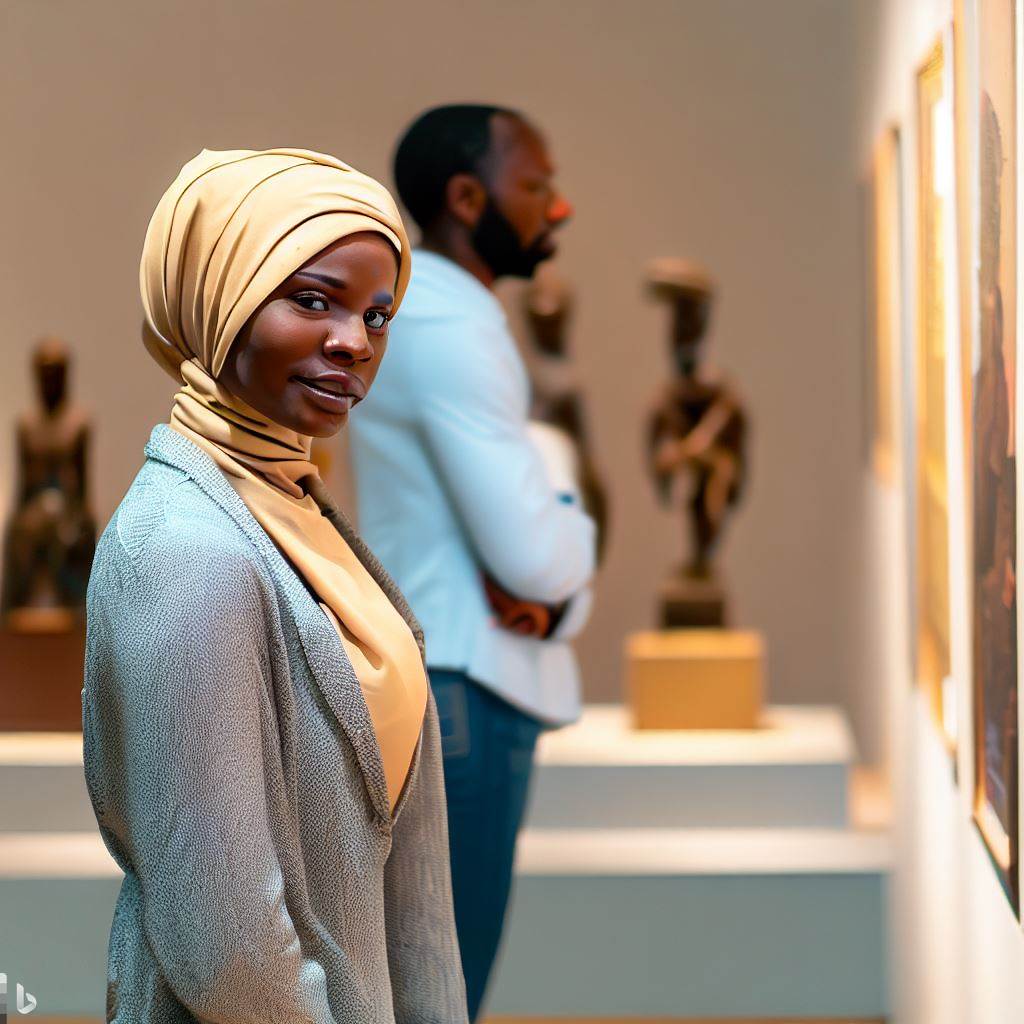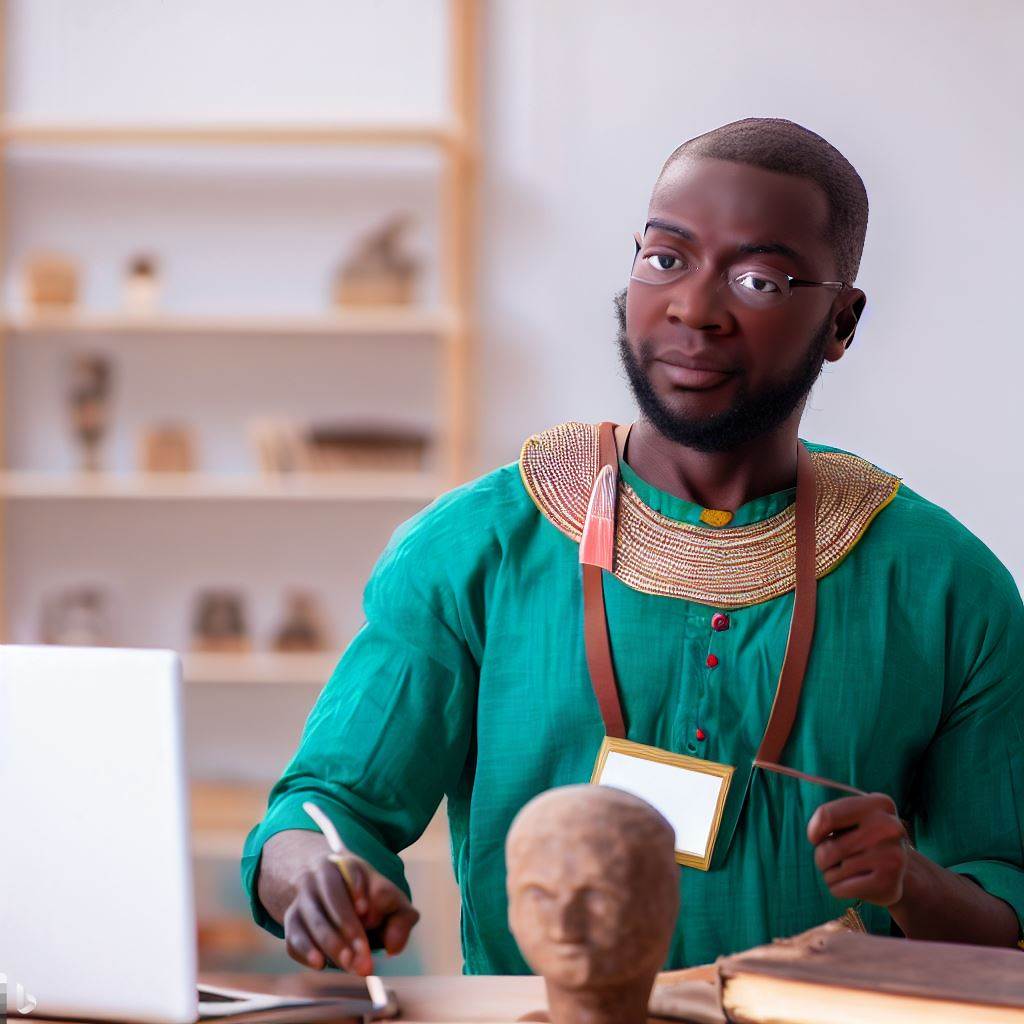Introduction
Curators in Nigeria play a vital role in preserving and showcasing the country’s rich cultural heritage.
Funding and support are crucial for curators to carry out their responsibilities effectively and to expand their impact.
Curators are the guardians of Nigeria’s rich cultural tapestry, weaving history, tradition, and innovation into vibrant exhibitions.
- Cultural Custodians: They serve as custodians, preserving our heritage through art, artifacts, and exhibitions.
- Narrators of History: Curators are the storytellers, ensuring that our history and culture are not forgotten.
- Promoters of Creativity: They champion contemporary artists, fueling innovation in Nigeria’s art scene.
- Need for Support: However, curators face challenges in funding and support, hindering their crucial work.
- Vibrant Arts Scene: Adequate funding can breathe life into Nigeria’s arts scene, benefiting artists and audiences alike.
- Expanding Horizons: Investment in curators opens doors to international collaborations, broadening cultural horizons.
- Collective Responsibility: It’s a collective responsibility to empower curators, preserving and celebrating Nigeria’s cultural mosaic.
In this exploration of funding and support for curators, we uncover the vital role they play in Nigeria’s cultural narrative and why supporting their work is an investment in our shared heritage.
Current challenges faced by curators in Nigeria
- Lack of financial resources: Many curators in Nigeria struggle with limited funds to support their exhibitions and projects.
- Limited access to grants and funding opportunities: Curators face difficulties in finding and applying for grants and funding options available to them.
- Inadequate institutional support: Curators often lack the necessary support from institutions such as museums and galleries to carry out their work effectively.
- Absence of professional development programs for curators: Nigeria lacks programs that provide curators with the necessary skills and knowledge to excel in their field.
These challenges pose significant barriers and hurdles for curators in Nigeria.
Lack of financial resources restricts curators from realizing their vision and potential in their exhibitions and projects.
Limited access to grants and funding opportunities limits curators’ ability to secure financial support for their work.
Inadequate institutional support means that curators face difficulties in obtaining resources and assistance from museums and galleries.
The absence of professional development programs hinders curators’ growth and progress in their careers.
These challenges combined create a challenging environment for curators in Nigeria, making it harder for them to succeed.
Lack of financial resources prevents curators from purchasing necessary materials and creating impactful exhibitions.
Limited access to grants and funding opportunities makes it hard for curators to secure financial support for their projects.
Inadequate institutional support hampers curators’ ability to access exhibition spaces and obtain necessary resources.
The absence of professional development programs deprives curators of opportunities to learn and improve their skills.
With these challenges, curators in Nigeria face an uphill battle to make their mark in the arts and culture scene.
Potential solutions and strategies that can help address these challenges
However, there are potential solutions and strategies that can help address these challenges.
- Establishing funding initiatives: Creating specific funding programs aimed at supporting curators can alleviate financial constraints.
- Strengthening grant and funding networks: Improving access to grants and funding opportunities can empower curators to secure necessary financial support.
- Enhancing institutional support: Establishing partnerships between curators and institutions can provide the necessary resources and support.
- Introducing professional development programs: Implementing training and mentorship programs can equip curators with essential skills.
By implementing these solutions, Nigeria can foster an environment that nurtures and supports curators.
With increased financial resources, curators can bring innovative and impactful exhibitions to life.
Better access to grants and funding opportunities enables curators to sustain their work and reach a wider audience.
Institutional support allows curators to collaborate and showcase their work in professional exhibition spaces.
Professional development programs equip curators with the skills and knowledge necessary to excel in their field.
These solutions have the potential to transform the landscape for curators in Nigeria and drive their success.
Basically, curators in Nigeria face significant challenges in terms of financial resources, access to grants, institutional support, and professional development programs.
However, with targeted funding initiatives, improved grant networks, strengthened institutional support, and the introduction of professional development programs, these challenges can be overcome.
By addressing these challenges head-on, Nigeria can create an environment that empowers curators and allows them to thrive in their artistic endeavors.
Read: The Evolution of Curatorial Practices in Nigeria
Available funding options for curators in Nigeria
Curators play a crucial role in preserving, presenting, and promoting art and cultural heritage in Nigeria.
However, funding and support for curators in the country are often limited, making it challenging for them to carry out their work effectively.
To address this issue, various funding options are available for curators in Nigeria.
These options can provide financial resources, networking opportunities, and professional development support.
Government grants and initiatives
One significant avenue for funding is through government grants and initiatives.
The Nigerian government recognizes the importance of supporting the arts and culture sector and has established programs specifically for curators.
These programs often require curators to submit proposals and meet certain criteria to be eligible for funding.
By discussing existing programs and their requirements, curators can gain insights into available opportunities and tailor their proposals accordingly.
It is essential to highlight success stories and the impact of funded projects to demonstrate the value of government support.
International grants and scholarships
Another source of funding for Nigerian curators is through international grants and scholarships.
Many international organizations offer grants and scholarships specifically for curators from developing countries.
These opportunities provide access to funding as well as exposure to a broader network of curators and cultural institutions.
By exploring these options, curators can find opportunities to further their professional development and gain international recognition.
However, it is crucial to discuss the eligibility criteria and application process to ensure a successful application.
Corporate sponsorships and partnerships
In addition to governmental and international funding, curators can also seek support from corporate sponsorships and partnerships.
Many companies in Nigeria have corporate social responsibility initiatives that focus on promoting arts and culture.
By discussing potential collaboration avenues with these companies, curators can forge mutually beneficial relationships that provide financial support and exposure.
It is important to highlight successful partnerships in the past to demonstrate the value of such collaborations to both curators and corporate entities.
Overall, there are multiple funding options available for curators in Nigeria.
By exploring government grants and initiatives, international grants and scholarships, as well as corporate sponsorships and partnerships, curators can access the resources they need to carry out their work effectively.
It is crucial for curators to be aware of these funding options and actively pursue them to ensure the sustainability and growth of the arts and cultural sector in Nigeria.
Read: How to Get Your First Curator Job in Nigeria
Support networks for curators in Nigeria
Support networks and communities are essential for the growth and development of curators in Nigeria.
These networks provide funding, resources, and opportunities for curators to thrive in their practice.
In this section, we will explore the various support networks available to curators in Nigeria, focusing on non-profit organizations and associations, as well as mentoring programs and peer support.
Non-profit organizations and associations
There are several prominent organizations in Nigeria that actively support curators.
These organizations aim to promote and enhance the curatorial practice in the country.
They provide financial assistance, resources, and platforms for curators to showcase their work and connect with a wider audience.
One such organization is the Society of Nigerian Artists (SNA). SNA is a non-profit association that represents and supports visual artists, including curators, across Nigeria.
They organize exhibitions, workshops, and seminars that provide curators with opportunities to showcase their work, learn from experienced professionals, and network with their peers.
Another notable organization is the Nigerian Curators Association (NCA). NCA focuses exclusively on providing support to curators in the country.
Their activities range from organizing curatorial training programs to facilitating collaborations between curators and other cultural institutions.
This association is dedicated to fostering a strong and vibrant curatorial community in Nigeria.
Mentoring programs and peer support
Mentorship plays a crucial role in the professional development and growth of curators in Nigeria.
Experienced curators provide guidance, share their knowledge and expertise, and offer valuable feedback to emerging curators.
Mentorship programs help curators navigate the challenges of the field and provide them with opportunities for personal and artistic growth.
There are several existing mentoring programs available for curators in Nigeria. The Arthouse Foundation Mentoring Program is one such initiative.
It provides emerging curators with the opportunity to work closely with experienced curators on exhibitions, research projects, and public programs.
This program aims to bridge the gap between established and emerging curators and foster meaningful collaborations.
Additionally, the Goethe-Institut Nigeria offers a mentoring program specifically designed for curators.
This program provides curators with the necessary skills and knowledge to curate exhibitions and develop their curatorial practice.
It also connects curators with international networks and opportunities for further development.
Building peer networks
In addition to formal mentoring programs, curators in Nigeria can benefit from building peer networks.
Peer networks enable curators to engage in dialogue, exchange ideas, and receive constructive criticism from their peers.
These networks can be established through informal gatherings, workshops, and online platforms.
Generally, support networks for curators in Nigeria are crucial for their growth and development.
Non-profit organizations and associations provide funding, resources, and opportunities for curators to showcase their work.
Mentoring programs offer guidance and support, while peer networks facilitate collaboration and knowledge exchange.
These networks contribute to a vibrant and thriving curatorial community in Nigeria.
Read: Freelance Curating in Nigeria: Tips and Insights

Case studies of successful curators in Nigeria
Notable curators who have overcome funding and support obstacles
- Abiola Oke: Established the Rele Arts Foundation, advocating for young artists and securing funding through partnerships.
- Adenrele Sonariwo: Founded Rele Gallery, a renowned space, by securing initial funding from private investors.
- Oyinda Fakeye: Overcame funding challenges through crowdfunding campaigns for her exhibitions.
- Olajumoke Adeleke: Leveraged social media to garner support from local businesses and individuals.
Their achievements and contributions to the art scene
- Abiola Oke’s Rele Arts Foundation has supported numerous emerging artists, providing them with exhibition opportunities.
- Adenrele Sonariwo’s Rele Gallery has showcased groundbreaking contemporary art, contributing to Nigeria’s cultural landscape.
- Oyinda Fakeye’s exhibitions have successfully promoted Nigerian art both locally and internationally.
- Olajumoke Adeleke’s initiatives have encouraged community engagement and uplifted aspiring artists.
Insights into how they navigated challenges and received support
- Abiola Oke collaborated with corporate sponsors, used social media to engage a wider audience, and sought public grants.
- Adenrele Sonariwo established partnerships with art institutions, secured private investments, and diversified revenue streams.
- Oyinda Fakeye utilized online platforms to connect with art enthusiasts globally and build a loyal support base.
- Olajumoke Adeleke developed relationships with local businesses, organized fundraisers, and sought collaborations.
Read: The Influence of International Curators in Nigeria
Recommendations for improving funding and support for curators in Nigeria
Advocacy for increased government investment
- Engage in lobbying efforts to encourage the government to allocate more funds towards curators.
- Highlight the cultural and economic value of curators in Nigeria to gain governmental support.
- Collaborate with other arts and cultural organizations to amplify the advocacy message.
- Educate policymakers about the importance of curators in preserving and showcasing Nigeria’s rich cultural heritage.
- Organize conferences and public forums to raise awareness about the funding needs of curators.
Collaboration between funding institutions and curators
- Establish partnerships between funding institutions and curators to facilitate financial support.
- Encourage funding organizations to provide grants specifically for curatorial projects and exhibitions.
- Create platforms for regular dialogue and collaboration between curators and funding institutions.
- Promote transparency and accountability in the allocation and utilization of funding resources.
- Develop guidelines and frameworks to streamline the application and selection process for funding opportunities.
Development of professional development programs
- Design training programs and workshops to enhance the skills and expertise of curators in Nigeria.
- Collaborate with educational institutions to offer specialized curatorial courses and certifications.
- Establish mentorship programs connecting experienced curators with emerging talents.
- Provide financial support for curators to attend international conferences and exhibitions for knowledge exchange.
- Encourage continuous learning and professional growth through online resources and networking opportunities.
Strengthening support networks for curators
- Create professional associations or networks to foster collaboration and support among curators.
- Organize regular meetings and networking events to facilitate knowledge sharing and peer learning.
- Establish a platform or database to connect curators with potential mentors, collaborators, and funding opportunities.
- Provide access to legal and administrative support services for curators.
- Develop a system for sharing best practices and success stories within the curator community.
By implementing these recommendations, Nigeria can enhance funding and support for curators, ultimately enriching its cultural landscape and promoting artistic excellence.
Conclusion
Funding and support for curators play a crucial role in the growth and development of the Nigerian art scene.
In review, funding and support are the pillars upon which the world of curation stands.
- Artistic Ecosystem: Curators play an indispensable role in nurturing the Nigerian artistic ecosystem.
- Financial Backing: Adequate funding is the lifeblood that enables curators to breathe life into art.
- Diverse Avenues: From government grants to private sponsorships, a multitude of avenues exist to bolster curation.
- Emerging Talents: Support for emerging curators paves the way for fresh, innovative voices to emerge.
- Art’s Vitality: The health of the art scene in Nigeria is intrinsically tied to the sustainability of curators.
- Collective Effort: Both government and private stakeholders must collaborate to ensure a thriving arts environment.
- Cultural Richness: Nigeria’s rich and diverse culture deserves a vibrant arts scene, made possible through adequate funding.
As the final brushstroke on this canvas, we emphasize that investing in curators is investing in the preservation and evolution of Nigeria’s artistic heritage. It’s a commitment to fostering creativity and cultural expression that will continue to resonate through generations.
By recognizing the vital role of curators and providing them with the financial and institutional support they need, Nigeria can paint a brighter future for its arts and culture.




